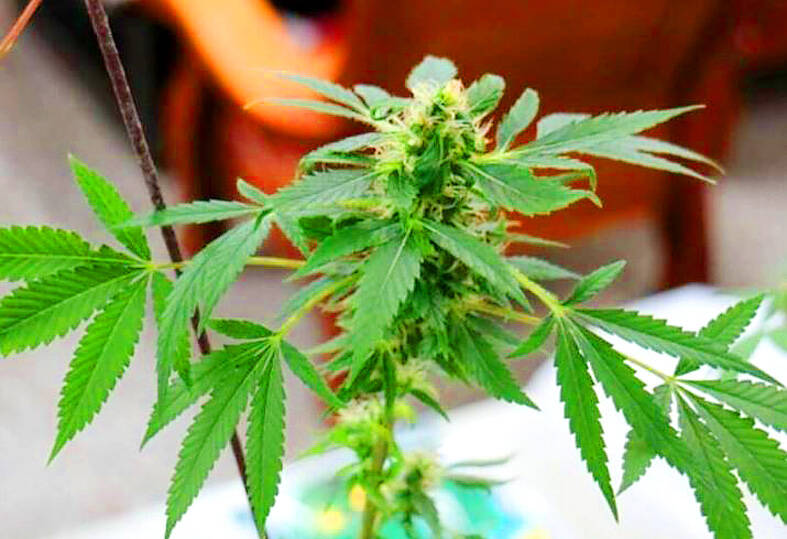A farmer in Miaoli County faces prosecution after finding a packet of seeds by the roadside, which he took home and planted, only to find that they produced cannabis plants, police said.
Police on Thursday quoted the farmer, surnamed Yeh (葉), who is in his 50s, as saying that, in February, he found a packet of seeds on the ground next to a garbage bin on a rural road branching off Provincial Highway No. 3 near his farm in Miaoli’s Dahu Township (大湖).
He had always had an interest in cultivating plants, and as he was curious about the unidentified seeds, he took them home and planted some, Yeh said in a recorded statement to the police.

Photo: Taipei Times file
After three months, he found that three of the seeds had sprouted, but because the seedlings grew gradually he did not know what they were at first, Yeh said, adding that he later thought they looked like cannabis, but was still was unsure.
He asked the police to help him identify the plants, and when officers went to his home they found three healthy seedlings growing and a packet of about 800 seeds, which were identified as cannabis, police said.
The police said they confiscated the seedlings and the seeds, and took urine samples from Yeh, which came back clean.
A background check found that Yeh had no previous record of drug possession, but police said they had to follow procedure and took him to the Miaoli District Prosecutors’ Office for prosecution.
Cannabis is classified as a Category 2 narcotic under the Narcotics Hazard Prevention Act (毒品危害防制條例), so Yeh must be prosecuted as he had planted the seeds and was in possession of cannabis plants, police said.
As Yeh reported the plants and seeds to the police he can expect a lesser sentence for unknowingly contravening the law, police said.
Earlier last week, police in Chiayi County conducted a raid in Fanlu Township (番路) and found cannabis oil products and pouches of “narcotic coffee powder” and tools for packaging.
A further search uncovered assorted narcotics inside a large polystyrene box labeled as fresh seafood and 20 packets of white powder, which turned out to be 7.3kg of heroin.
Police said it was one of the largest hauls of heroin found in Taiwan recently.
Testing found that the box contained one packet of amphetamine, 82 bottles of cannabis oil for vaping, one box of cannabis chocolates and nine pouches of mephedrone, police said.
Overall, judicial investigators estimated that the drugs seized had a street value of NT$40 million (US$1.26 million).
The house was rented by a man surnamed Tsai (蔡), who now faces prosecution.
Additional reporting by Jason Pan

A strong continental cold air mass is to bring pollutants to Taiwan from tomorrow, the Ministry of Environment said today, as it issued an “orange” air quality alert for most of the country. All of Taiwan except for Hualien and Taitung counties is to be under an “orange” air quality alert tomorrow, indicating air quality that is unhealthy for sensitive groups. In China, areas from Shandong to Shanghai have been enveloped in haze since Saturday, the ministry said in a news release. Yesterday, hourly concentrations of PM2.5 in these areas ranged from 65 to 160 micrograms per cubic meter (mg/m³), and pollutants were

Taiwan’s armed forces have established response protocols for a wide range of sudden contingencies, including the “Wan Chun Plan” to protect the head of state, the Ministry of Defense (MND) said today. After US President Donald Trump on Saturday launched a series of airstrikes in Venezuela and kidnapped Venezuelan President Nicolas Maduro, concerns have been raised as to whether China would launch a similar “decapitation strike” on Taiwan. The armed forces regularly coordinate with relevant agencies and practice drills to ensure preparedness for a wide range of scenarios, Vice Minister of National Defense Hsu Szu-chien (徐斯儉) told reporters before a

EVA Airways on Saturday said that it had suspended a pilot and opened an investigation after he allegedly lost his temper and punched the first officer several times as their plane was taxiing before takeoff at Los Angeles International Airport. According to a report published on Thursday by The Reporter, the incident occurred after the flight’s Malaysian first officer tried to warn the Taiwanese pilot, surnamed Wen (文), that he was taxiing faster than the speed limit of 30 knots (55.6kph). After alerting the pilot several times without response, the first officer manually applied the brakes in accordance with standard operating

NOT AN OPENING: Trump’s violation of international law does not affect China’s consideration in attacking Taiwan; Beijing lacks capability, not precedent, an official said Taiwanese officials see the US’ capture of the president of Venezuela as a powerful deterrent to Beijing’s aggression and a timely reminder of the US’ ability to defeat militaries equipped with Chinese-made weapons. The strikes that toppled Venezuelan President Nicolas Maduro signaled to authoritarian leaders, including Chinese President Xi Jinping (習近平), US President Donald Trump’s willingness to use military might for international affairs core to US interests, one senior official in Taipei’s security circle said. That reassured Taiwan, the person said. Taipei has also dismissed the idea that Trump’s apparent violation of international law could embolden Beijing, said the official, who was not